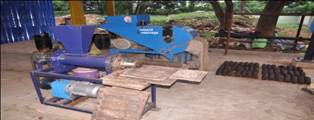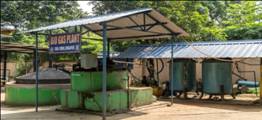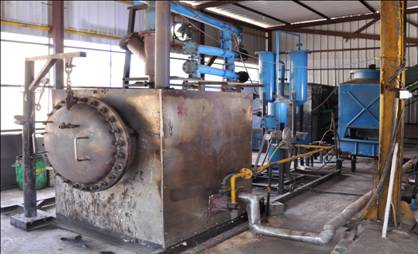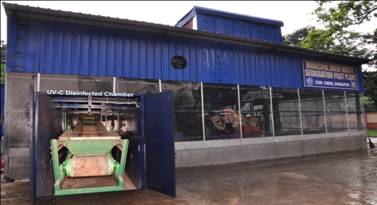Ministry of Science & Technology
Sustainable Processing of Municipal Solid Waste: ‘Waste to Wealth’
Posted On:
23 OCT 2020 6:43PM by PIB Delhi
With an ever increasing population and rapid pace of urbanization, the country is facing a huge challenge of waste management. The volume of waste is projected to rise from the present 62 million tonnes to about 150 million tonnes by 2030. Indiscriminate dumping of garbage at the current rate without appropriate scientific treatment, would impose huge requirement of landfill area per year. This necessitates the importance of scientific solid waste management in today’s context.
Solid Waste treatment and disposal utilizing plasma arc gasification process is an option for eco-friendly solid waste management in which large volume reduction of waste up to 95% is possible. The plasma gasification process uses electricity to generate high temperature plasma arc (above 3000°C) inside the plasma reactor which converts the waste into syngas. The produced syngas when passed through a series of gas purification system comprising of catalytic converter, redox reactor, cyclone separator, scrubber and condenser is ready for use in gas engines for generation of electricity.The residual ash can bemixed with cement for preparation of recycled bricks for usage in construction. Thus, Science helps in the creation of ‘Wealth from Waste’.
However, this technology is not economically viable as energy requirements for waste treatment using this technology is very high (~ 1.5 kWh/kg of waste processed for small plants (< 100 MT capacity) and ~ 1.2 kWh/kg of waste processed for plants with greater than 100 MT capacity). In addition, the high rate of electrode consumption (~ 500 mg/kg of waste processed) further leads to an increase in recurring expenses making the process expensive and not an economically-rationalised option.
Studies suggest that the Municipal Solid Wastes generated in India mostly consists of alarge fraction (> 50%) of organic wastes. Unscientific disposal of organic waste produces greenhouse gas (GHG) emissionsand other air pollutants.The ineffective processing of MSWalso is the root cause of many diseases as the dumped landfills transform into Contamination Hubs for Pathogens, Bacteria and Viruses. The most commonly used processing "composting" also does not yield impactful economic returns for the entrepreneurs as it requires more land space, more labour, pasteurization for effective disinfectionand has restricted utilization due to presence of heavy metals. During the rainy season managing composting becomes difficult due to the presence of excessive moisture.
New Technology
The CSIR-CMERI developed Municipal Solid Waste Processing Facility has not only helped achieving decentralized decimation of solid wastes, but has also helped create value-added end-products from abundantly available redundant stuffs such as dry leaves, dry grass etc. The MSW Processing Facility is developed for disposal of solid waste in a scientific way following the Solid Waste Management Rules (SWM) 2016 prescribed by Union Ministry of Environment, Forests and Climate Change (MoEF&CC), Govt. of India. The primary focus of CSIR-CMERI is to unburden the common households from the segregation responsibilities through advanced segregation techniques. The mechanized segregation system segregates solid waste into metallic waste (metal body, metal container etc.), biodegradable waste (foods, vegetables, fruits, grass etc.), non-biodegradable (plastics, packaging material, pouches, bottles etc.) & inert (glass, stones etc.) wastes. The bio-degradable component of the waste is decomposed in an anaerobic environment popularly known as bio-gasification. In this process biogas is liberated through conversion of organic matter. The biogas can be used as fuel for cooking purpose. The gas can also be utilized in gas engine for generation of electricity. The residual slurry from biogas plant is converted to compost in a natural process known as vermi-composting by introducing earthworms. The vermi-compost is utilized in organic farming.
Biomass Waste Disposal
Biomass waste such as dry leaves, dead branches, dry grass etc. are disposed of by first shredding it to suitable size followed by mixing with the slurry of the biogas digester. This mixture is feedstock for briquette, which is utilized as fuel for cooking. These briquettes are also being utilized in gasifier for production of syngas which can be utilized in gas engine for generation of electricity. The ash produced from burning of briquette is mixed with cement and water in an appropriate proportion for production of bricks which is used for construction work.


Polymer Waste Disposal
The polymer waste consisting of plastics, sanitary waste etc. is being disposed of through two main processes i.e. pyrolysis and plasma gasification. In the pyrolysis process, the polymer waste is heated to a temperature of 400 – 600°C in an anaerobic environment in presence of suitable catalyst. The volatile matter from the polymer waste comes out as a result of heating which on condensation gives pyrolysis oil. The non-condensed syngas and crude pyrolysis oil after purification are reused for heating purposes and it helps in obtaining self-sustainability. The solid residue known as char is mixed with the biogas slurry for production of briquette.

Sanitary Waste Disposal
The sanitary items including masks, sanitary napkins, diapers etc. are disposed-off utilizing high temperature plasma. The MSW facility is equipped with special disinfection capabilities to help break the COVID Chain through UV-C Lights and Hot-Air Convection methods. The Decentralized Solid Waste Management Plant developed by CSIR-CMERI has all the potentials to scientifically manage the Solid Waste including the COVID and other viruses present in the wastes. The integrated MSWpilot plant is also self-sufficient in terms of energy requirement through the installation of roof-mounted solar panels, which can also feed the surplus energy supply onto a mini-grid.

The technology of decentralized (0.5 to 5.0 ton/day) MSW and its sustainable(negligible transport to reduce the burden of imported diesel and created CO2 pollution) processing opens-up the opportunities to realise the dream of generating 100 GW Solar Power and a city with a "Zero-Waste and Zero-Landfill Ecology", and may become a “Source of Job Creation” through both process-engagement and manufacturing, which can help support the MSEs, Start-Ups and numerous Small Entrepreneurs across the Nation.
*****
NB/KGS/(CSIR-CMERI inputs)
(Release ID: 1667099)
Visitor Counter : 8080